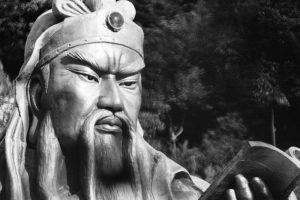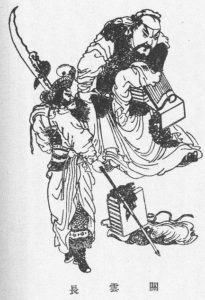關羽
Guan Yu, Deity of Martialdom
________________________________________

The 24th day of the sixth lunar month [1] is celebrated in the honour of the birthday of Guan Yu [關羽], who was a Chinese general during the late Eastern Han dynasty. He was serving under the command of Liu Bei and played a major part in the founding of the state of Shu Han by Liu Bei during the Three Kingdoms period. Guan Yu was bestowed the status of a deity in the Sui dynasty (581–618), and is revered as bodhisattva in Buddhism and as a guardian deity in Taoism. Furthermore, Confucianists also hold him in high regard. Kristofer Schipper in《The Taoist Body》describes Guan Yu as “a model of loyalty and courage, the incarnation of the chivalric spirit, protector of the Manchu dynasty and patron of merchants..[and] a hero of the period of the Three Kingdoms (220-265). Guan Yu, moreover, is known by his religious names of Emperor Guan [guan di 關帝] and Duke Guan [guan gong 關公], Holy Emperor Lord Guan [guan sheng di jun 關聖帝君]. His other posthumous titles include Guan, the Loyal and Righteous God of War, the Holy Great Deity [zhong yi shen wu guan sheng da di 義神武關聖大帝], Guan the Holy Great Deity; God of War Manifesting Benevolence, Bravery and Prestige; Protector of the Country and Defender of the People; Proud and Honest Supporter of Peace and Reconciliation; Promoter of Morality, Loyalty and Righteousness [ren yong wei xian hu  guo bao min jing cheng sui jing yi zan xuan de zhong yi shen wu guan sheng da di 仁勇護國保民精誠綏靖翊贊宣德忠義神武關聖大帝] and Holy Emperor Guan, the Great God Who Subdues Demons in the Three Worlds and Whose Awe Spreads Far and Moves Heaven [san jie fu mo da shen wei yuan zhen tian zun guan sheng di jun 三界伏魔大神威遠震天尊關聖帝君). The last name reflects the common people worship for him for his control over evil Spirit and, thus, statues of him can be found ubiquitously in restaurants and hotels. While Confucius is referred to as the Sage of Culture [wen sheng 文聖]; Guan Yu takes the counterpart as the Sage of War [wu sheng 武聖]. Despite his common appellation in the West as God of War, Guan Yu, he does not grant blessing to those who go to war or battle, but rather to those who abide by the code of brotherhood and righteousness. Thus, he has become a symbol of loyalty and integrity, so he is not only a natural favourite of soldiers but has been chosen as patron of numerous trades and professions. The following story from《Records of the Three Kingdoms》[san guo zhi 三国志] is to exemplify and demonstrate Guan Yu’s bravery and unflinching willpower:
guo bao min jing cheng sui jing yi zan xuan de zhong yi shen wu guan sheng da di 仁勇護國保民精誠綏靖翊贊宣德忠義神武關聖大帝] and Holy Emperor Guan, the Great God Who Subdues Demons in the Three Worlds and Whose Awe Spreads Far and Moves Heaven [san jie fu mo da shen wei yuan zhen tian zun guan sheng di jun 三界伏魔大神威遠震天尊關聖帝君). The last name reflects the common people worship for him for his control over evil Spirit and, thus, statues of him can be found ubiquitously in restaurants and hotels. While Confucius is referred to as the Sage of Culture [wen sheng 文聖]; Guan Yu takes the counterpart as the Sage of War [wu sheng 武聖]. Despite his common appellation in the West as God of War, Guan Yu, he does not grant blessing to those who go to war or battle, but rather to those who abide by the code of brotherhood and righteousness. Thus, he has become a symbol of loyalty and integrity, so he is not only a natural favourite of soldiers but has been chosen as patron of numerous trades and professions. The following story from《Records of the Three Kingdoms》[san guo zhi 三国志] is to exemplify and demonstrate Guan Yu’s bravery and unflinching willpower:
羽尝为流矢所中,贯其右臂,后创虽愈,每至阴雨,骨常疼痛。医曰:“矢镞有毒,毒入于骨,当破臂作创,刮骨去毒,然后此患乃除耳。”羽便伸臂令医劈之。时羽适请诸将饮食相对,臂血流离,盈于盘器,而羽割炙引酒,言笑自若。
When [Guan] Yu experienced being hit by a stray arrow, piercing his right arm, [although] after the wound had completely healed, every time arriving at Yin-rains, the bone constantly was in pain. The doctor said: The arrowhead was poisonous, [and] the poison has entered the bone. After the bone is scraped and the poison removed, thereupon this suffering will be eliminated. [Guan] Yu then stretched out [his] arm and ordered the doctor to split it open. At the time when [Guan] Yu just invited all the generals to eat and drink opposite [of him], his arm’s blood dripped departing [ his body], filling a tray utensil, yet [Guan] Yu cut the roast and was involved in drinking, speaking and laughing [in a] composed [way].
_______________________________________________
[1] Since this date is fixed by the Chinese lunar or farmer’s calendar, its converted Gregorian calendar date will differ from year to year, depending on when the Chinese New Year commences.
